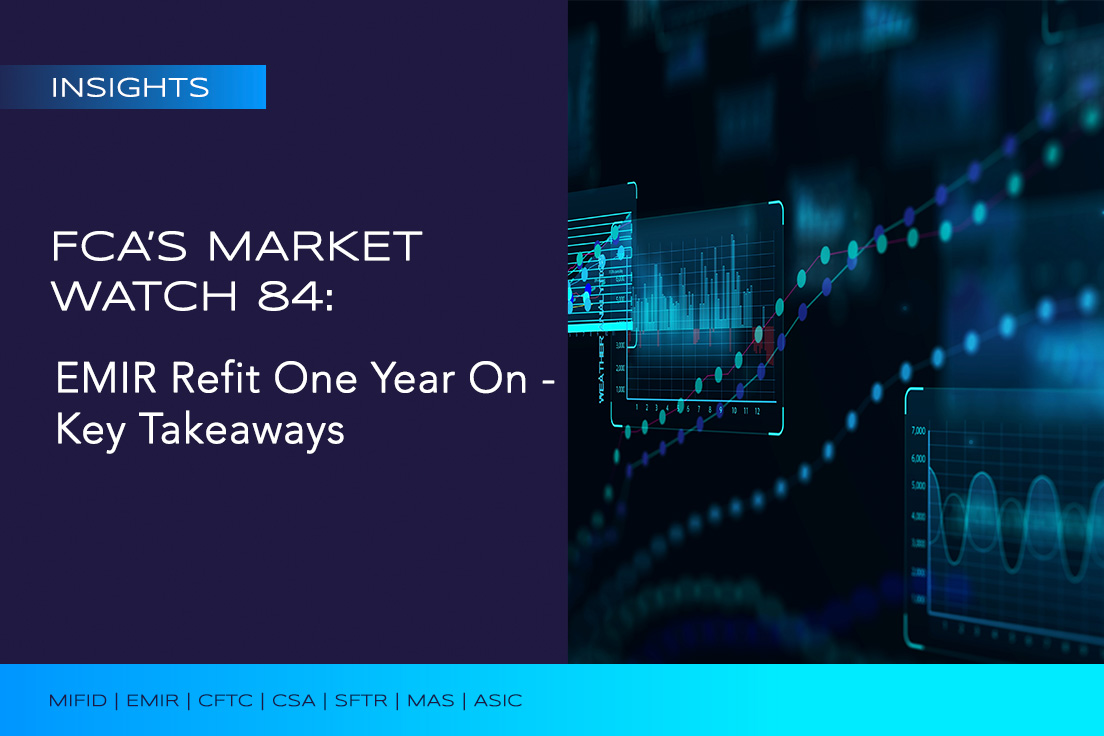Key Takeaways from
FCA's Market Watch 84
UK EMIR Refit: One Year On
 Author: Sophia Fulugunya
Author: Sophia Fulugunya
Director of Transaction Reporting
8 October 2025
Market Watch 84 marks a milestone as the first Market Watch dedicated to the UK EMIR Refit. It provides valuable insight into how the regime has developed since go-live, highlighting key supervisory themes, lessons learned, and areas of ongoing focus for firms.
1. EMIR Refit - A Positive First Year
The implementation of EMIR Refit has been broadly successful. Many firms prepared early, engaged constructively, and demonstrated a commitment to achieving data quality from the outset.
Transparency has played a central role in this progress. A significant proportion of firms proactively reported issues or omissions, showing that early engagement supports faster remediation and helps identify areas where additional clarity may be needed.
2. Governance, Oversight, and Third-Party Accountability
Strong governance remains critical under EMIR Refit. Firms that rely on third-party service providers should remember that accountability for reporting accuracy and completeness always rests with the reporting counterparty.
Key expectations include:
- Embedding EMIR reporting within broader risk and control frameworks.
- Conducting regular data quality assessments that are proportionate to firm size and complexity.
- Ensuring robust change management practices, including sufficient testing, planning, and stakeholder sign-off before implementation.
Clear governance structures and effective oversight continue to distinguish firms that are able to detect, resolve, and prevent issues efficiently.
3. Breach Notifications and Early Communication
One of the strongest messages in Market Watch 84 is the importance of timely breach notifications. The number of EMIR breach notifications remains lower than expected given the size of the reporting population, suggesting that under-reporting may still be an issue.
Submitting a breach notification is generally viewed positively. It indicates that a firm’s systems and controls are working to identify, assess, and remediate problems. Firms are encouraged to engage early, even when investigations are ongoing, and to take a principles-based approach when determining materiality. Factors such as scale, duration, and business impact should guide this assessment.
4. Data Quality and Supervisory Engagement
Data quality continues to be a core supervisory focus. Firms are expected to demonstrate ownership of their reporting processes, supported by effective validation, reconciliation, and exception management.
Supervisory interactions, such as information requests or reviews are intended to support improvements rather than act as punitive measures. Firms that respond transparently, acknowledge issues, and present clear remediation plans tend to achieve better supervisory outcomes.
5. Looking Ahead - Simplification and Proportionality
The focus now turns to simplifying reporting where possible, while maintaining high standards of data integrity. Areas of interest include:
- Reducing duplication across reporting regimes.
- Ensuring proportionality for smaller firms, where compliance costs can be disproportionately high.
- Maintaining alignment with global standards through collaboration with international bodies.
- Preserving dual-sided reporting, which continues to provide valuable data quality insights.
The overarching direction is one of refinement rather than reform, improving efficiency without undermining transparency or market oversight.
Conclusion
Market Watch 84 underscores that success under EMIR Refit depends on three factors: strong governance, transparent communication, and a proactive culture of compliance. Firms that prioritise these principles will be best placed to deliver high-quality reporting, maintain regulatory confidence, and support a resilient post-trade reporting ecosystem.
